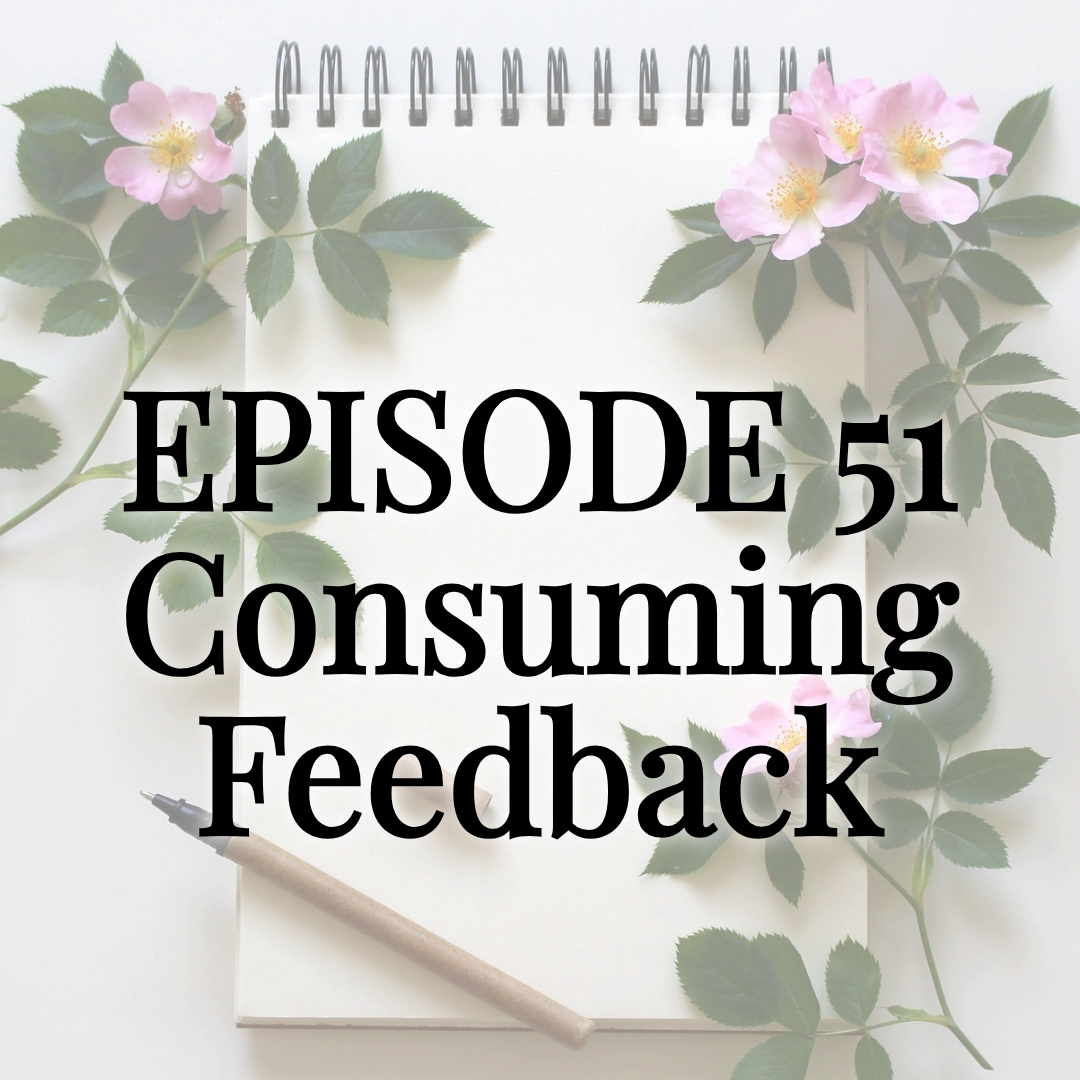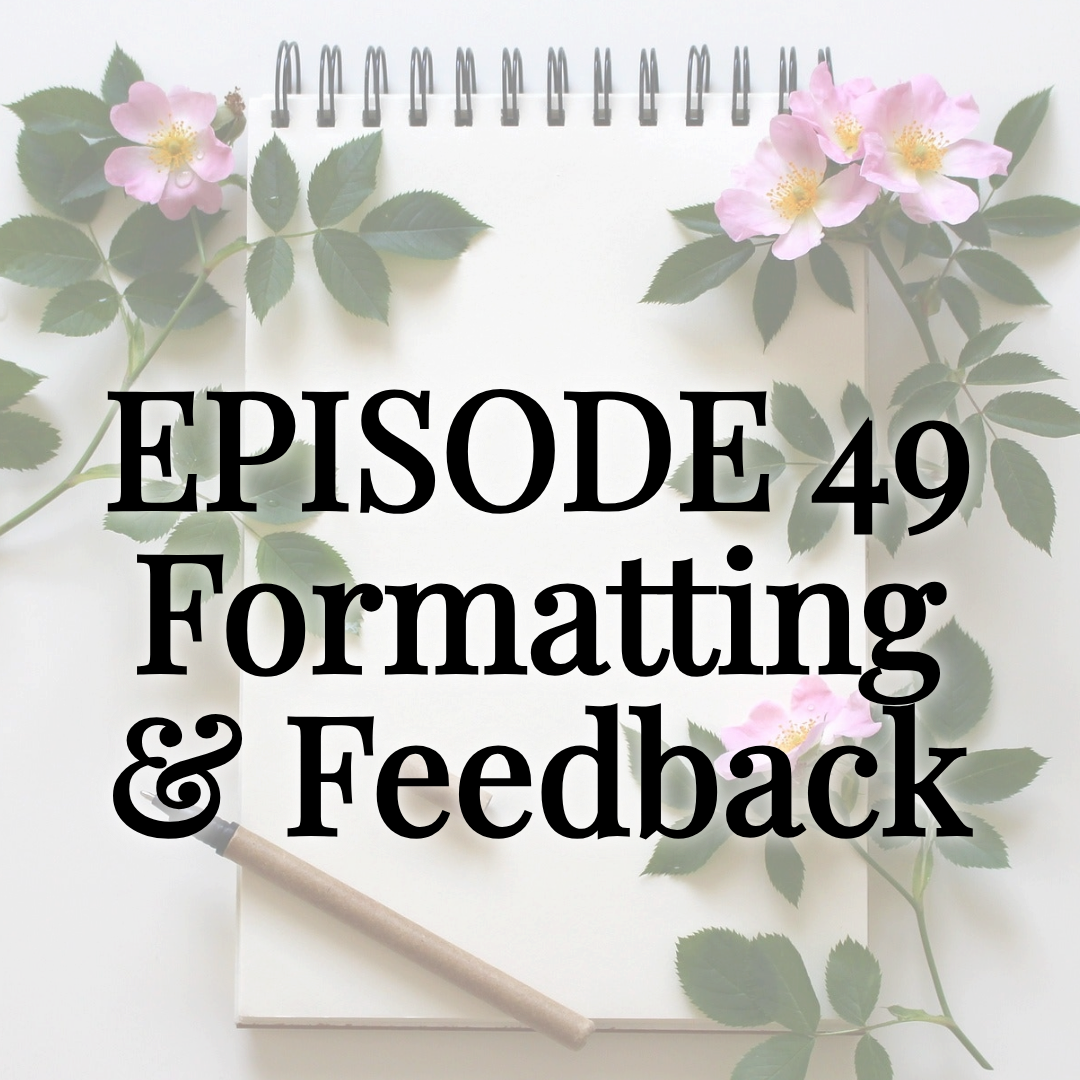Deus Ex Machina: Story Savvy Self-Editing Episode 20
My sincere thanks to Silvie Pawn for guest-hosting!

Additional thoughts:
When I use an example of Harry Potter and the Sorcerer's Stone climax, talking about keeping the Chosen One trope out of the protagonist's mindset, I got a little off track. What I'd meant to get at is that Harry had no thoughts of being a Chosen One, or having any abilities beyond what he knew himself to have, when he chose to enter the climax gauntlet, knowing who/what he'd face. The fact that he did have a Chosen One trope waiting for him in his touch being an unexpected asset played no part at all in him choosing to go face the climax action, and because he deals with Fluffy, and the flying keys, potions, and chess without any special Chosen One powers, the reader doesn't get too much of a sense of Deus ex Machina from the small last portion of the climax that has that unexpected overpower.
I also want to clarify that twist reveals about shapeshifter characters can be Deus ex Machina, but aren't automatically that. Check out episode 23, which is all about plot twists and covers this in more depth!
You can find the links to Christy's books in the show notes below! I really appreciate her stepping in on short notice to cover for my usual co-host, Agnes Wolfe.
Episode 20 Overview:
Deus Ex Machina
"Do I have any Deus Ex Machina that I need to fix?
Put another way, are all of the elements of the climax subtly seeded through the story leading up to it as possibilities?"
In this week’s Story Savvy episode, developmental editor Rebecca Hartwell explores a common writing mistake, Deus ex Machina, and how to improve your writing skills in this writing podcast for authors. Deus ex Machina is when there is a sudden, overpowered solution to the global story problems that steals a protagonist’s agency and risks breaking the story’s logic, world building, or payoff. Episode 20 of the 52-Week Story Savvy series is a deep-dive into how to write climaxes that feel earned, not convenient, and how to avoid one of the most book-ruining mistakes in modern fiction writing.
Joining Rebecca is guest host Silvie Pawn, author of the Godsend series [https://www.facebook.com/GodsendSaga]. She is filling in for host of Authors’ Alcove Agnes Wolfe [authorsalcove.com]. Together, they unpack what qualifies as Deus ex Machina, how the Chosen One trope can slip into it, and how to revise your story so that big moments have proper weight and foreshadowing.
They also discuss:
- Spotting and preventing Deus ex Machina moments
- Strengthening your protagonist’s agency in climactic scenes
- Using foreshadowing to set up powerful payoffs
- Managing twist reveals vs. reader betrayal
- Revising Chosen One arcs with clarity and intention
- Identifying plot problems during the editing phase
Whether you're dealing with overpowered characters, late-stage twists, or poor beta feedback, this episode offers concrete tools to help you craft a stronger, more satisfying ending.
In This Episode:
- Defining Deus ex Machina and why it breaks narrative trust
- How to use foreshadowing to avoid forced plot resolutions
- Tools to reinforce character agency and avoid abrupt power-ups
- Making Chosen One stories work without cliché
- Real-world editing examples of what to avoid
- When certain genres allow for rule-breaking (and how to do it right)
Recommended Resources:
Silvie Pawn’s Godsend Saga Series –
https://www.facebook.com/GodsendSaga
Authors’ Alcove Membership Community –
http://authorsalcove.com
Book Giveaway –
http://authorsalcove.org
See you next week for episode 21: Word Count Self-Editing
Episode 20 Transcript:
Deus Ex Machina
Rebecca Hartwell: Hello and welcome to the Hart Bound Editing Podcast.
This is episode 20 of the weekly Story Savvy series where we tackle the 52 biggest self-editing topics and tips to help you make your good story great as a published (and soon to be published) author asks me, a developmental editor, all of the questions that you have wanted to.
My usual co-host Agnes and I have covered a bunch in this series so far and last week my last guest host Sue and I went over catching and addressing plot holes and character inconsistencies. Today my temporary new co-host Sylvia and I are going to take a look at Deus ex Machina. By the end of this episode, you'll hopefully feel confident defining and identifying what Deus ex Machina is and have a solid grasp on how to fix it, and when to do so, in your own work.
Joining me to ask all of the questions is my friend Sylvia Pawn, author of Godsend.
Hello.
Sylvia Pawn: Hi. I'm excited to tackle this topic with you as it is by far one of the most story-breaking issues you can have in a book.
Rebecca: Why don't you tell us a little bit more about you and your writing before we dive in with our first question?
Sylvia: So, a little about me. I am a self-published author. I've currently got a pre editing version of the first book of the Godsend series out on Amazon. I am kind of a little funny with the way I like to write. I decided at 14 to write the Godsend series and decided to commit to a seven-book series where each of the book names corresponds with a letter in the series because one series I saw as a kid did that and I was like I like, “I like that.”
Rebecca: Nice.
Sylvia: So, the first book is Grace, and the series follows a group of teenage superhumans who discover that they got their superpowers from a super soldier experiment that technically went wrong but also went right.
Rebecca: Fun!
Sylvia: And so, it follows them becoming these—the stereotypical supervillains to the media and the government and to the rest of the world. Whereas they're actually the superheroes because they are battling against the government, who is kind of turning the teenage superheroes into super soldiers as young as 12 and 13 years old.
So, I know you have mentioned Deus ex Machina in previous episodes of the show, but what exactly does that mean? Because I'm sure I'm not the only one who needed to Google this.
Rebecca: Right. It's Latin. I can't really blame anyone. So, Deus ex Machina literally translates to “the God in the machine,” and the term comes from ancient Greek plays where that was an expected aspect of that storytelling. You would have these human characters getting themselves into all kinds of trouble, trouble and building up these big issues. And then, you know, Apollo would come down from Olympus and snap his fingers and everything would be fixed. And that was not only an accepted, but an expected, part of that storytelling—was that there were gods and they would come down and they would intervene. They would magically fix everything.
However, in modern storytelling, that is far less acceptable. It's much more expected nowadays—and by nowadays, I mean in the last, let's say, four centuries—that your protagonists, whoever they are, fix the climax themselves. So having a God, or to expand that, any overpowered entity that has not previously had any role in the story, show up in the climax and fix everything is going to annoy your readers, because they are invested in seeing how the characters that they have become invested in are going to figure stuff out and how they are going to triumph. And when you undercut that, and, instead of making your protagonist fix the issue, you have this random, overpowered character or creature or ability out of nowhere fix it, there's no payoff for them. There's no catharsis.
Another big part of this that I just want to mention here is that one of the ways to look at the issue of Deus ex Machina is that it takes agency away from your protagonist. And I've definitely talked about this in other episodes, particularly around our character arcs.
But when you have this God, or power, or whatever entity, come down, fix it, it takes all of the agency away from your protagonist in the moment where you want them to have the most, being the climax. So that hopefully explains what it is and where it comes from and how it can be interpreted in modern fiction, and why it should be avoided at just a baseline.
Sylvia: Is this always a problem? Or is it okay to have some elements of Deus ex machina, like if, you know, you're partway through the series and it's meant to be a plot device used later on, but it's not immediately explained?
Rebecca: Yeah. So, I'd say that in modern fiction, which is what I write, what I edit, what I talk about, it is always a problem that should be fixed. Like, pure Deus ex machina. If it's just a twist reveal, that's different. And I think we'll get into that a little bit more later in this series. But if it is true Deus ex machina, then modern genre readers just aren't open to it. So, if you're wanting to set things up for later in the series, then you need to set it up. You need to do foreshadowing, and seeding, and make sure that it has a build and payoff, rather than dropping out of nowhere at the highest adrenaline point of the book.
Sylvia: So, I've heard a lot of examples of it, and one thing that I know it happens a lot in is D&D. Usually it's because players just sidestep or speed run things, and so the DM has to kind of go in and go, "Okay, okay, here's some help." And there are a lot of movie, TV adaptations, books—like the Drizzit series—where campaigns and stories are turned into books and other media.
If you are trying to make an adaptation of a D&D campaign where you had to do Deus ex machina in the campaign itself, do you find a way to add in things that, like, the campaign didn't have? Do you think it would be acceptable if you put in the preface, "This is word for word, or based on, a D&D campaign I ran once upon a time?” Do you think it'd be more accepted? Do you think there would still be arguments or fighting on having to make that decision as a DM and then putting that into the book because you love your players and you don't want them to lose their characters, right?
Rebecca: So, that's a great example of how different medias have different expectations. So, in role playing games, you have to do stuff like that. You have to be able to pivot on a dime and introduce things out of nowhere and use that sort of on-the-spot storytelling. And that is totally valid for that format.
However, in written genre fiction, that's a different media with different expectations. So, if you want to take a D&D campaign and turn it into a novel, you are going to have to change some aspects. It's not going to transfer over one-to-one. Smoothly, at least.
So, what I recommend is that you either just take your favorite moments from that D&D campaign, or maybe your favorite characters and use them in a novel format. Or you try to just take the elements that you think are going to be unexpected and seed them a lot more.
As far as sort of trying to get a better grasp on what is and isn’t Deus ex Machina, and looking at some common examples—one of the most common examples that I’ve had pointed out to me of “Well, you can’t call this Deus ex Machina because this was fine”—is the climax of the second Harry Potter book, where the phoenix Fawkes carries in a magical hat that drops a magical sword on Harry’s head. And because of this, and only because of this, he’s able to win in the climax. However, I don’t think that that is Deus ex machina, and I’m going to go over some of my reasoning for that in the hopes that that is helpful. If memory serves, despite it being a decade since I last read that series, it’s not Deus ex machina because Fawkes is mentioned several times in the book leading up to that point. And there are mentions of Gryffindor valuing loyalty, and there is an established connection between Harry and phoenixes because of that feather in his wand—even if it hasn’t been revealed yet that that literally is Fawkes’s feather.
So having all of those aspects set up, when that climax moment happens, that some people can interpret as Deus ex Machina, the reader still has an opportunity to go, “Oh no, I kind of remember that mention, and that mention, and that mention, and that mention,” and it feels more justified that this is happening. And it makes sense because it was established. And even with, you know, the phoenix tears fixing him, there’s enough precedent established long before you get to that point that phoenixes have magical powers beyond their regeneration. And generally, animals—magical animals—in this worldbuilding have special powers. So, I would comfortably say that it’s not Deus ex Machina.
It’s also very much worth mentioning here—and I’m sorry if I’m muddling up my memories between the book and the movie here, again, it’s been a long time—but Fawkes didn’t fix or win the climax instead of making the protagonist figure it out, to do what’s needed and triumph. Instead, this Deus ex Machina element simply provided one finite tool to enable the protagonist to enact their own agency to win in the climax. And only after that grand sacrifice is made, and Harry thinks he’s dying, but he still, you know, saved Ginny or whatever it was, does this second aspect of that Deus ex Machina—where his poisoned wound is healed—does that happen.
And yeah. He’s still prepared to pay the price. It was still him who stabbed the sword through the basilisk and got poisoned because of it. The Deus ex Machina there doesn’t count as such because it didn’t overpower, it didn’t take over, and it didn’t magically fix everything. It simply gave him one tool. So, it was still earned by the protagonist in all of the ways that it was. And some of the aspects were clarified after the fact, which is fine because they were still set up to then later be explained before we got to the climax. I’m hoping that example is helpful.
Sylvia: It is. And I also feel like the best Harry Potter example to use would be the fourth Harry Potter installment, at the end, when Harry's got the wand connection, when all of the spirits suddenly show up. It gets explained after the fact, but they're suddenly there, and his parents are like, "Oh, we'll take care of this while you run." That's a better example of this could have been Deus ex Machina if it hadn't been explained that this is common—if someone has taken the lives of other people, that that leaves an imprint of memory.
Rebecca: Right.
Sylvia: But if that hadn't been explained after the fact, that would have been an example of Deus ex Machina.
Rebecca: Yeah, yeah. And… But even there, there was seeding, there was foreshadowing of, "Oh, Voldemort has the same wand core that you do"—that was planted in the first book and got paid off in that fourth climax. And there's also the aspect, again, of: those ghosts couldn't do a whole lot. They didn’t actually do much. They blinded him for whatever, three seconds, and it was still Harry who chose to pick up a wand, summon the cup, and transport himself and the dead guy—whose name I'm blanking on—back to somewhere safe. Right. Like again, it wasn't a matter of, "Oh, the ghosts appear, and they kill Voldemort. There we go.”
Sylvia: With little seedings being so spaced out, I could see that being used more as an example from the series then everything that they fed to people in book two alone, causing book two's ending for books worth. A lot of people are going to forget those little things and that's going to feel like it came out of nowhere.
Rebecca: Totally fair. Yep.
Sylvia: So, my next question is, does genre affect how forgiving readers are of Deus ex Machina? For example, the Fawkes moment in Harry Potter book is often forgiven. Having to do the same thing in D&D and trying to put that into book format.
Rebecca: Yeah.
Sylvia: When researching what it is and looking for examples, most examples are sci-fi or fantasy. Though I myself know of, like, you know, some rom-com things where some random person who's like, "Oh yeah, I'm this person's dad. Here's the resolve." Is it more common in certain genres, or is it just not as noticeable in other genres?
Rebecca: For sure. Fantasy and sci-fi are definitely the biggest culprits, and like you, I can think of some literary fiction even that has some aspects of that, but none that fully cross the line from what I’ve read. So, like with the Fawkes example, I don’t think that anything in the successful genre fiction of the last few centuries is truly, truly Deus ex Machina.
Even in fantasy and sci-fi, which again definitely have the most leeway, it's not generally acceptable, for example, the Fawkes thing to happen, if phoenixes had never been mentioned as part of this worldbuilding, or if the Sorting Hat was only explained to be remotely magical or sentient after the fact and it had just been a normal hat up to that point. Or if the connection between the protagonist’s character build and the previous owner of that sword hadn’t been established at all. Things like that.
There is some wiggle room for how much effort you put into establishing the foreshadowing and the seeding that prevents it from being Deus ex Machina, which can be very closely related to the reality-genre spectrum. So, if you're writing in a genre that has high reality expectations—let's say straight historical fiction—you have to do a lot more work to avoid Deus ex Machina. Whereas in fantasy and sci-fi, which is the far end of that reality spectrum, there’s a lot more wiggle room.
However, I don’t think that there are any genres—with maybe some very minor examples I will mention at the end of this episode—where you can get away with doing none. You have to do some justification in all genres to avoid Deus ex Machina, but the degree to which you have to do so varies.
Sylvia: So, I know that the Chosen One trope is common in fantasy, and I feel like it can make it very easy to fall into having Deus ex Machina in the payoff. Heavily. Heavily. That’s the reason I avoid the Chosen One trope.
Rebecca: But it is common.
Sylvia: What are the common problems around this specifically, and how can authors avoid that issue with this particular trope?
Rebecca: So, common issues, I think, are pretty much what you’ve already touched on. It’s just when you have your character suddenly overpowered, and I definitely touched on this in previous episodes, but when your character has a level-up moment—and that’s often in the climax—there has to be aspects of it feeling earned. And the Chosen One trope can often make it feel like it wasn’t earned, which is going to lose a lot of the faith of your readers, or their investment in that protagonist and the outcome of their actions. So that’s kind of the one common issue that I see with that.
As far as how I would suggest addressing this is that you make sure that you’re seeding that Chosen One trope through the whole book, not just in the climax, to avoid that Deus ex Machina. If it was seeded, and the reader can see the payoff of that Chosen One-self as both surprising in that moment and inevitable in retrospect, looking back at the rest of the story, it’s not a problem. So that’s one way to approach it.
But if, let’s say, you don’t want the protagonist to know that they are the Chosen One until the climax, then there are several ways that can work here and that I have helped clients with.
First, see where you could incredibly subtly hint that they are (or will be) the Chosen One through their arena—so the world around them—or through secondary avatars. Even if the protagonist themselves totally miss those hints, or ignore, them or don’t believe them.
The second piece of advice here would be: very clearly establish what that Chosen One is expected to do, from whatever prophecies you have established. What powers signify the Chosen One? What actions signify the Chosen One? And everything else like that. So doing that in the abstract is going to allow your protagonist to believe that they 100%, without question, will fail in the climax because they aren’t the Chosen One. They don’t think they are the Chosen One. And then, only in that climax, in that fun little twist, you have that revelation for them that they are in fact the Chosen One and now have a chance of winning. But you have still seeded the concept of the Chosen One up to that point.
Third point here is—and this is kind of bonus points on the last one as well—have a secondary character be set up as the Chosen One. Make everyone believe that this other person is the Chosen One, so obviously the protagonist can’t be. And then the reveal in the climax isn’t, “Oh, there is a Chosen One.” It is, “Oh wait, no—the Chosen One is this person and not that one.” And that’s not Deus ex Machina, because you’ve established the expectations, the powers, all of these different aspects. And then the twist is simply who gets to use them at the end.
Fourth and finally on this: make that Chosen One trope an aspect of the worldbuilding, but not your protagonist’s mindset. So essentially, the protagonist doesn’t think about it at all while they are winning the climax, they are acting how they would even if they weren’t the Chosen One. Then only after the triumph as their ordinary, authentic selves, does the acknowledgment or revelation that they just did something that made them the Chosen One come to the surface and be explained to the readers. We were already talking about Harry Potter, so I’ll use that as an example—in book one, where he has his Chosen One status of, you know, “love makes you untouchable to someone as hateful as Voldemort,” and he just touches Quirrell, and he turns to ash and all that kind of stuff. The reader and the protagonist have no idea how or why that happens while it is doing so. Harry realizes that he has this slightly special ability. He does it. He doesn’t really expect to survive the situation, and he has no understanding that he is the Chosen One. But once he wakes up in the hospital, someone else—Dumbledore—explains to him, “Hey, this is why this happened. You are the Chosen One.” And this is a perfect example of him being the Chosen One had nothing to do with how or why he won in the climax. Therefore—well, I guess it has a little bit to do with why he won—but mindset-wise, it has nothing to do with it. He doesn’t go into this going, “I’m the Chosen One.” So, that’s one way that you can approach it. But still, you kind of have to set up a little bit for that. And they did in that book. They were seeding that Chosen One-ness from when he first met Quirrell and he wouldn’t touch his hands, and when he was explained to why his parents died—all that kind of stuff.
Sylvia: So, foreshadowing can be our friend as far as making sure we have elements of the climax throughout the story, especially to avoid Deus ex Machina. My novel that’s currently in the pre-editing published version, it plays a little—I did misspeak—it plays a little bit on the Chosen One trope. She gets told—because her power is omnipotence—it’s told from her point of view. So, you get to see the internal struggles and all of the morals telling her, “Okay, yeah, I could just make our enemies not exist anymore and we’d be fine. But can I live with myself if I do that?” So, she has friends and people telling her, “You have the power to just make this not a problem anymore.” But she’s sitting there going, “Hmm, I don’t know if I can.” And so, she struggles with that in and out. And in the end, there’s no Chosen One thing—it’s all of them working together.
So how do you balance avoiding the issue of Deus ex Machina and making the climax too predictable or expected? Especially with the Chosen One trope?
Rebecca: Right. First of all, subverting it is a fantastic option. I love it when people can take a trope and, like you just explained with your work, give it a nice little twist so that it’s not going to pay off or play out exactly how people expect it. That is a fantastic first step there.
Beyond that, I definitely have a couple of tools here that I regularly offer my clients if they’re getting anywhere near either end of that Deus ex Machina or way-too-predictable spectrum.
First of all, see how divorced you can make those foreshadowing aspects and the actual climax that will happen in the awareness of your protagonist. So, if your protagonist is, you know, going along and they have certain expectations for how the climax is going to go, see if you can drop those hints in a way that their brain—their POV—does not connect at all. So, if there’s going to be a magic sword dropped on their head to save the day, then have them always thinking about that sword in the context of their personal identity, and their social standing, and their school club, and not remotely in the context of killing a giant snake or defeating a ghost. That’s going to help it keep from becoming predictable or too obvious of what you’re building up to.
Second, go subtler with your hints. Do you, currently, in an overstated version of this book, have a hint bluntly stated? Okay, switch it to vaguer language. Does your protagonist find a book on the exact topic that they need to, so that you’re setting up your Deus ex Machina aspect? Okay, cool, if you think that’s overstating it, make the book in a language that they don’t translate particularly well. Or, you know, make it a book of riddles. Or make it a really biased book by, you know, some author who was trying to make this look as bad as possible, so the truth is, you know, somewhere in there, but it’s not obvious. Essentially, the hints only need to be clearly identifiable in retrospect. They do not need to be totally clear about what’s coming in the moments that they are coming up.
The third tool here would be to make sure that you are setting your protagonist up to reasonably expect something from the climax other than what it ends up being, and keep them focused on that incorrect expectation right up until the point where that shifts. If you foreshadow more than one way the climax might play out—with roughly equal likelihood established for the different options—then the one you end up going with won’t feel too predictable, because the reader didn’t know which way it was going to go until the last minute.
Lastly, this is definitely something to get outside feedback on. It can be very hard to gauge as the author of a work if something is coming across as Deus ex Machina.
Sylvia: So, are there any specific situations where there are exceptions to any of these Deus ex Machina guidelines? Especially like, you know, me writing in my book, you know, there’s not a lot of hinting and foreshadowing that can be done. You know, with her power being omnipotence, she has to build it up so, like, she can do small, minor things at first, but bigger things just wipe her out for multiple days. But also, like, if she were to find a book that would tell her exactly how to go about the things, she could just make herself read that language.
Rebecca: Sure.
Sylvia: So, like, what are specific situations where there are exceptions to any of these guidelines?
Rebecca: Sure. So, the exceptions are generally falling into three categories.
The first would be the opening of books. I have had clients ask me, like, “Oh, I think I have Deus ex Machina right at the beginning of my book.” And I'm like, that's not a thing. You're fine. The reader has no expectation that things are established or predictable in the opening of a book. So go as wild as you want. Just make sure that you explain it after the fact and maintain it as part of your worldbuilding.
Second—and that being said—be very careful in your series. You can rely on earlier books in a series as foreshadowing, but not all of the way, not 100%. You still need to remind readers about the world aspects, or character abilities, or previous events from previous books in the series that might come across as Deus ex Machina through the earlier parts of that specific book. You don't want to get to the climax of book four and have a creature show up that no mention was made of before in book four, but was a character in book two—and you're relying on your readers to remember that.
The last exception here is if you want to play with Deus ex Machina, the most accepting spaces for that story element would be in: absurdism genre of any description, in religious fiction—where it is literally the God in the machine that comes in and saves the day That can be a trope of that genre—and sometimes in flash fiction where there just isn't enough time or space to foreshadow much. But because of those genre requirements—or, sorry, restrictions—the readers are going to be prepared for that, so it's not nearly as much of an issue.
As far as your specific examples from your book, I think that if you simply pay attention to that aspect and you do as much as you can without breaking your story, that’s plenty. And if your book is specifically, as it sounds like, built around this idea of omnipotence, and you're playing with these exact elements and concepts that could build into Deus ex Machina, then you're going to have the readers kind of on your side more. You're going to already have them more on the page of “We can't see everything coming,” or “We can see everything coming and there's only so much we can do.” So, if you have themes of the same aspects that are going to end up feeling like Deus ex Machina in the payoff woven throughout, you're doing—hopefully—enough to prevent that from really feeling that way. But again, if you really have concerns about that, get outside feedback and see what a developmental editor or a really, really good beta reader might be able to help with around that.
Sylvia: So, one thing that I've done, trying to get around the idea of that, is she is, like, halfway through the book when she finally figures out she has a power. The first half of the book is her realizing, “Oh, hey, I'm suddenly not an outcast. I'm suddenly super popular.” Everything she's ever wanted is finally happening for her, and she's got no clue. So, when she finds out her crush has a superpower and, you know, finds out from this guy who works for the—like, it’s a super soldier who’s been, like, secretly trying to feed them information because he's like, “This is… this is bad, this is bad, this is bad. I know what you're doing. Please just, like, be safe.” They tell her friends, and everyone's like, “Oh thank God, we have powers too.” And she's like, “Oh, okay, so I’m the only one who doesn't.” And it gets broken down for her—“Have you not noticed that everything you've pretty much ever wanted outside of dating him has come true?”
She’s like, “Oh.” And they're like, “You have a superpower.” And then after that halfway point is when she starts getting the little bits of, “Well, obviously you're omnipotent, so you could just make this all end.” And she's like, “Oh.” She's like, neutral good. She’s struggling.
Rebecca: So, she's an example of—you set up the topic before you started introducing the overpower aspects. I think that's great. Hopefully this whole episode will be helpful.
Sylvia: So far, from what I've written, it doesn't feel like I'm at the point of the Deus ex Machina. Even, like, the very ending of my book is setting up that there are things that are too much for her, and if it’s too much she ends up very weak. Fortunately, it's helping me realize I'm not quite at the point of Deus ex Machina. Hopefully won't get there.
Rebecca: I mean, this is a self-editing series. It's not assuming that every story has each of these issues. And if listeners end up listening to any topic—including this one—and going, "Nope, I'm good," then that still served its purpose. You've still mentally checked to see if it is an issue, and if it is, then you can fix it.
Sylvia: Can you give us some examples of how you've seen Deus ex Machina show up in books you edited?
Rebecca: Yes. So, without outing any of my wonderful clients directly...
One example was a previously unknown creature—I don’t remember if it was like a chimera or a Valkyrie or something—that had never been mentioned before in that book showed up and completely took over for the protagonist while the protagonist was having a breakdown in the climax. And this was a later book in a series, which is part of why I brought that up earlier, was: apparently this—I’ll call it a Valkyrie because I don’t actually remember what it was—had been established in book two, but it had never come up. Not even one passing mention in the entirety of book four, until it shows up in person in the climax and completely takes the agency from the protagonist.
Another example that I have personally run across was—again—a previously unknown creature. Again, I don’t particularly remember, I think it was some sort of ogre, became the literal dungeon boss fight of this book that previously had nothing setting up for that. It was not a particularly D&D-ish kind of book. The boss had nothing to do with the frankly awesome villain that had been set up. It had nothing to do with anything up to that point. But it was the entire climax. So that was definitely not necessarily Deus ex Machina as, you know, a power coming in and fixing the climax—but coming out of absolutely nowhere as a major aspect of the climax, can also feel kind of like that.
A third example would be, oh, the protagonist passed out at the beginning of the climax, and their sidekick suddenly and out of nowhere, with no foreshadowing, became much more intelligent and powerful than it had ever been hinted at being. And again, fully took over the climax in making all of those hard decisions and enacting all of those greatest acts of agency instead of the now-unconscious protagonist.
All of these things, obviously, are about stealing agency. So even if it's not a God coming in and fixing everything, if it’s a large aspect of the climax that had no foreshadowing, or if it takes the protagonist's agency completely away, it is a problem—like I’d mentioned way back at the beginning.
Sylvia: So, those are all really great points. The only time I've seen, like, the previously unknown creature becoming the literal boss fight—
Rebecca: Yeah.
Sylvia: I think I was a child when I read it. But, like, the author basically fed little things to make the characters and the audience think that this one—like, think like Scooby-Doo—where it’s like, “Oh, this person’s probably the bad guy. This person’s probably the bad guy.” And it’s just this random side character who—you—they mentioned the appearance of once. Or, like, someone in passing mentioned that this random person came through town. So, what it’s—those ones is actually really fun because it’s like, oh, this person actually had nothing to do with it. They just had this creepy appearance or lived in this creepy house of every… Monster house! The old guy. They thought the old guy was the big bad villain, and it turns out the house was evil and actually wanted to eat them.
Rebecca: You can have twist reveals that aren’t Deus ex Machina. And... and I love them, so I’m really glad you pointed out those examples.
Sylvia: So yeah, just, like, you got to mention just little things—like this random guy that lives in town that’s really creepy. Or, you know, the creepy guy is the one everyone thinks is the bad guy, but the one over here kind of whispering it—like Gríma Wormtongue whispering it into everyone’s ears—is the bad guy.
Rebecca: It doesn't have to be clear at the time. It only has to be clear in retrospect. 100%.
Sylvia: And then. I know we need to wrap up, but I do have one last question.
Rebecca: Okay.
Sylvia: What are some of the best ways to fix a Deus ex Machina if we find any in our story or get feedback that something is coming across that way?
Rebecca: All right, so we've touched on a bunch, so I'll just list them real quick here.
-Foreshadowing or seeding—they mean the same thing, I just tend to use seeding more.
-Shifting more agency to the protagonist alone in the climax or whatever other moment you think has Deus ex Machina.
-Removing the overpowered aspects entirely to force the protagonist to win with whatever they have more.
-And then lastly, reducing how much help the Deus ex Machina aspect provides. So instead of killing the bad guy for the protagonist, they give them the small tool that they need to do so. Or instead of completely saving the day, they just distract the bad guy for three seconds while the protagonist can get away.
Those are... those are kind of the basic tools. And beyond that, if you Google Deus ex Machina, you can probably find more approaches or ways of looking at it.
Sylvia: To go with something you just said—like, taking just, you know, a small aspect of things—my first thought was the D&D movie.
Rebecca: Yeah.
Sylvia: Where it turns out the daughter had been invisible and slipped a cuff on, but what finally took out the witch was the druid coming in as an owlbear and just slamming her into the ground as the final blow.
Rebecca: And I love that moment because it's so good and it was perfectly built up and foreshadowed. So that is a fantastic example right there.
Sylvia: If the daughter had been the one to fully take down the bad guy when it wasn't really pointed at that she was really going to be doing much of anything, that could have felt a lot like a Deus ex Machina. But her just cutting off the magic powers, giving the druid a chance to just barrel through, that’s a perfect example of how to go about not ending up with it.
Rebecca: Absolutely.
Sylvia: So that's all the questions I have. Thank you so much. This has been a lot of fun and it's been very eye-opening for me, especially like with my fantasy series. Even what I’ve got so far—I say series, it’s either going to be one 700-page book or two 350-page books. I’ve got someone proofreading the 300 pages I have right now to tell me if I should make it one, like Lord of the Rings-length book, or split it into two.
So that also helped me realize for my fantasy novel how you identify who might have magic—and telling from the beginning, the eye colors, telling from the beginning that this character has eyes that might, might qualify, and then they do end up qualifying—that’s telling me—and it’s not also not like the big climax of the book, but it does tell me that, like, there’s not a Deus ex Machina drop in there.
Rebecca: Well, I'm glad to hear this was fun. This is very much fun for me as well. And honestly, that's like the perfect topic to end on because next week my next guest host and I are going to be going over word count and all of the ways that you should be paying attention to that in your books and in your self-editing. So, tune in, and hopefully that will be helpful as well.
Sylvia: It definitely will be.
Rebecca: For right now, I would really like to thank everyone for following along with this series. We would really appreciate it if you could help us out by liking and subscribing to the Hart Bound Editing Podcast and the Authors Alcove Podcast, where you can find lots more content for fantasy authors and readers. beyond this joint series. I also highly encourage you all to check out Sylvia’s awesome book and her upcoming books on—or sorry, at—Godsend Series on Facebook, or as SylviaPawnAuthor on TikTok. And I will definitely include those links in the episode description.
Thank you again, Sylvia.
Sylvia: Of course, I’m happy to be here. And this has really given me more of a drive to get back into writing. I had to stop for a while because of life events, but this has given me more of a drive—especially knowing that, like, I’m in the editing phase of book one. So that’s not something... I don’t really have to worry about trying to go in and adding more seeding into what happens at the end of book one, because there's enough there to kind of explain it.
Rebecca: Excellent. Well, I hope our listeners got as much out of it and thank you again. I’ll see you next time.
Sylvia: See you next time.
Rebecca: Thank you so much for listening to the Hart Bound Editing Podcast. I look forward to bringing you more content to help you make your good story great, so it can change lives and change your world. Follow along to hear more or visit my website—linked in the description—to learn how I can help you and your story to flourish.
See you next time!










